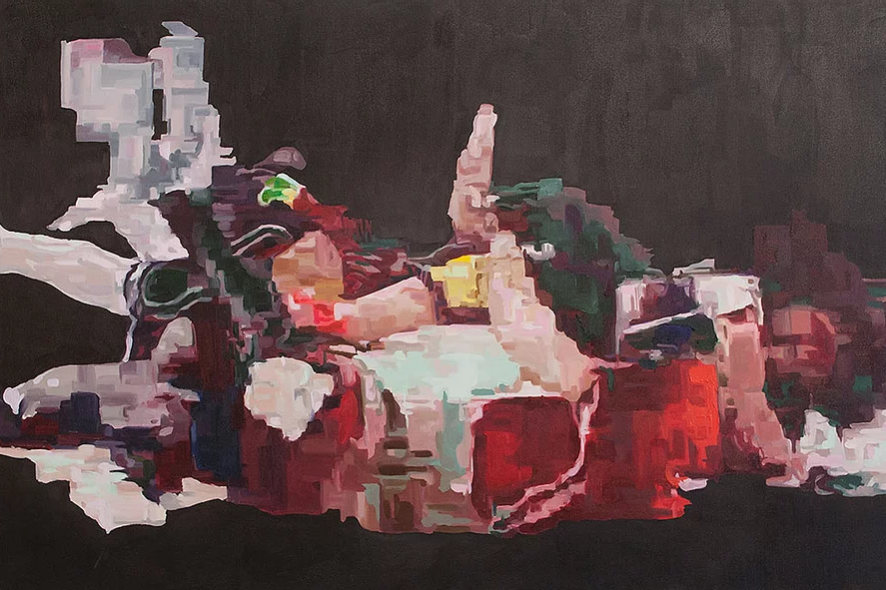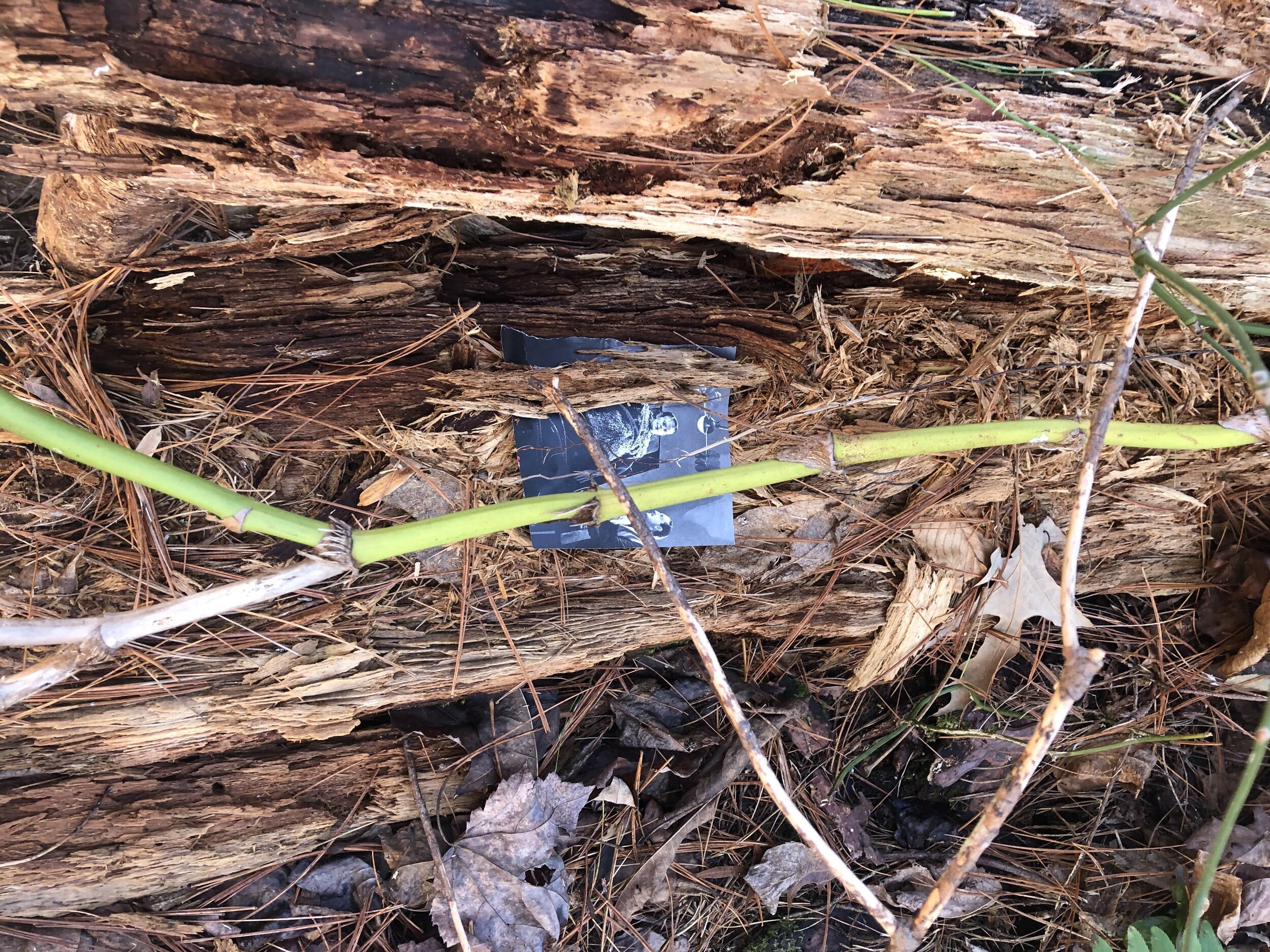Allison
Allison Spence is a multi-disciplinary artist seeking to subvert our expectations of form and representation She is currently a professor at Florida State University. In her art, she deals within a level of abstraction and figuration and creates a fragmentary existence based on the themes of bodies and how they take up space. She embraces the potential new meanings that abstraction allows for. She uses the masterful blending of boundaries to create work that is not easily categorized or defined. Recently, she's been making work that relates to the pandemic and her experiences.
Saria: How would you describe your artistic style?
Allison: My style, I don't think anyone has ever asked me about my style before. I usually tell people that I'm interested in doing non-paintings. I came from a background where I was trained to be a narrative figurative painter, which I completely abandoned after graduate school, and started to abandon that kind of body of painting altogether. It wasn't until the pandemic that I started to go back to more representational stuff. Actually, I don't know what it was, maybe it was the kind of sitting with myself too long and working on a small scale and touching things that made me sort of want to represent things a little bit more, at least this time. I generally like things that are beautiful but in a fundamentally upsetting or uncomfortable way. So, I do a lot of stuff about body horror, and I'm really interested in these indeterminate, determinant bodies that can kind of exist outside of our desire to categorize and label.
Saria: What do you think of abstraction as a form of expression, why do you use it?
Allison: There is a term that’s become a kind of like a slogan for me, particularly when I teach, pinning the butterfly. The moment that you name something and you decide what it knows, it's comfortable, and you can move on, and you know it, but now it's effectively dead. And it's a bit of a kind of violence in a way as well. So I find abstraction to be an easier way to create a space of possibility, of meanings, definitions, and communication. I like things that are a little nuanced, or a little bit vague, fuzzy around the edges. I don't like defined boundaries, because it feels like a trap to me, which is why I abandoned figure painting, when I was in grad school, I started to find myself really constricted by it. Especially coming out as a painter, all of that history, all of that kind of heavyweight of representation, and all of the definitions and kind of anatomy, their end just became too limiting. And that's usually why I go with abstraction; it allows a lot more possibility of meaning.
Saria: What are you most inspired by?
Allison: I watched a lot of films. It's one of my main sources of research. I do a lot of work that deals with like I've mentioned before, body horror, where the body is the kind of the main antagonist basically, sort of what your body can do or will do to you. When people ask me about artists, I usually don't say painters, and I sometimes don't even say artists in general, but I tend to drift towards biological science and medicine, experimentation and also natural bodies, organic bodies in nature. It relates to a series of work that I did about transplants if you graft an organ, you know, or some sort of part to a human being, the body is going to immediately try to reject it because it's foreign. Folks take medication, to stop it from being rejected, their entire lives, but plants you can graft together no problem; plants are a lot more accepting of new states of being. I'm inspired by things that give me moments that are outside of definable things, things that don't have an easy explanation. Strangely enough, the pandemic is super fascinating to me, even as it's incredibly distressing because suddenly everyone is super hyper-aware of their bodies in space in a manner that I think a lot of folks never really think about. In the kind of extension of their bodies. Like, breath is somehow connected to us and a weapon of some kind of virus; that I find fascinating, even if it is terrifying.
Saria: What is your process of actualization like?
Allison: I actually just finished with a two-year block, but usually what happens is I come across an idea or an instance of something that has happened; it might be a film, it might be a series of images or a book, or some sort of strange fact that I've read, or somebody told me. I'm really big on fun facts, something really odd, and I will get fixated on it. And then I will kind of think about how best to explore that. What would best communicate the things that fascinate me about that? So I sort of fly from thing to thing. Right now it's embroidery, before it was digital prints, there's a video that I've been trying to work on for a while. So it just has to do with the kind of underlying idea, but I'm generally very consistent with the things that fascinate me. Most of the time it’s kind of a waiting game, which isn't the most productive. For instance in my grad work A MASS, it's sort of like my origin story. I was researching something completely different. At the time I was really fascinated with Emma's anomic keys, which is a theme and in Greek art whereas the Amazons are fighting the Greeks. So I was trying to make one at the time and it was not working. I kept hearing about Wonder Woman, I didn't want to, I didn't want to paint Wonder Woman. And I was getting really frustrated, but at the time I was researching, like wrestling poses because it's a European Western wrestling style. So I was watching a whole bunch of wrestling videos And I somehow found a bunch of Japanese women's wrestling, which was really cool. So because they were so badly rendered I just started to pause them just to get images of possible poses. I kept on pausing between and the camera didn't translate it in the way that our eyes are translated. It just sort of translated it through the mediation into these blocks, and pixels. And then all of a sudden, I realized, I started to get really attracted to these. It was like crumpled-up cars or bubblegum. I started painting those because they excited me. From there, I just kind of never went back.
Saria: Did these ideas grow on you or have they always been on your mind?
Allison: I think I was. I've always been conscious of being in space, kind of filtering things through my own body in space. Probably that's, I think that's more of a personal quirk. I can't fully pinpoint where the fascination came from. Other than just simply being fascinated by things outside of our direct knowledge of things. I think I just generally have been suspicious of systems.
Saria: How does your personal identity factor into your work?
Allison: I'm conscious of being a body in space and the fact of being a woman that is a body and space. I kind of grew up around a certain amount of distinct categorical systems that I didn't feel comfortable in. When I was little, I was in a fantasy, and I was into science fiction. I think it was partially a form of escapism, but then those kinds of ideas of being outside of this sort of structure always excited me, so it led from there. My mother was a librarian so, I grew up with books everywhere and I was a fairly solitary person. I always had a lot of things in my head. And I could just process on my own, and then kind of externalized.
Saria: Have you seen a big change in your art?
Allison: I'm very consistent with a lot of the stuff that I do, I haven't felt like I exhausted my interests but I have less of an attachment to the methods that I use. I've got almost a little bit of an antagonistic relationship to material. I mean, I have that whole series of paintings that are literally just kind of crumbles and I believe when I was making those, I just had them on the floor and I would like to step on them. So, material is the thing that always changes. It's never my theme, that's constant.
Saria: What was the greatest part of your residency at Stove works
Allison: It was good to have a space that was so focused on art-making. Coming back from Stove Works has been such an interesting experience because I'm still teaching a contemporary foundations class. During that, your practice kind of goes into sort of talking and thinking about the systems, all these interlocking systems that power and define these other systems of meaning. Meanwhile, I still have a constant practice in the background. Stove Works provided us space, a kind of concentrated space of art-making and talking about the work with the community, however, distanced that was, it was useful and kind of Eutopic for a while, for my practice. And I'm sad now. It was like the real world and all of my responsibilities had just been waiting. I hadn't been putting them off, they were just waiting to dump on me. It was this really cosmic unfairness that came after leaving Stove Works.
Saria: What are you working on now?
Allison: I'm here in Florida back to teaching. I'm teaching and I'm continuing the projects that I started and worked on at Stove Works.




